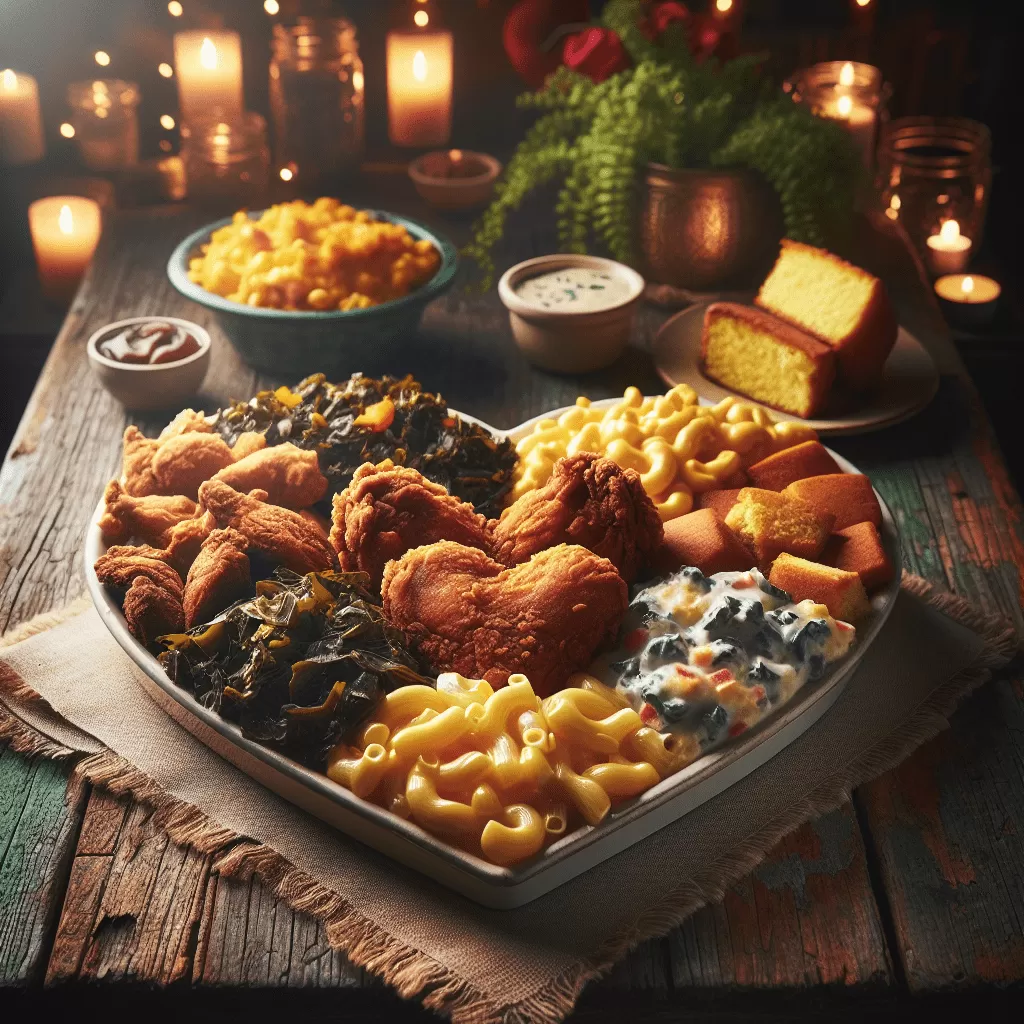Soul food tradition is a cherished culinary heritage that originated in the Southern United States, deeply rooted in African American culture.
This rich and flavorful cuisine emerged from the creativity and resilience of enslaved Africans who transformed modest ingredients into comforting, hearty meals.
Soul food embodies more than just sustenance; it’s a celebration of community, history, and the indomitable human spirit.
Today, we’ll explore the savory world of soul food, uncovering its origins, iconic dishes, and enduring legacy in American cuisine.
- The Roots of Soul: Tracing the Origins of Soul Food
- From Survival to Celebration: The Evolution of Soul Food
- The Soul Food Hall of Fame: 10 Iconic Dishes You Must Try
- The Health Debate: Navigating Soul Food's Nutritional Landscape
- Soul Food FAQs: Answering Your Burning Questions
- Soul Food in Pop Culture: From Kitchen Tables to Silver Screens
- The Future of Soul Food: Innovation and Preservation
- Cooking Up Community: Soul Food's Social Impact
- Soul Food Around the World: A Global Influence
- Preserving the Legacy: How You Can Support Soul Food Tradition
- Conclusion
The Roots of Soul: Tracing the Origins of Soul Food
Soul food’s story begins with the tragic history of slavery in America. Enslaved Africans brought with them culinary techniques and ingredients from their homelands, adapting them to the available resources in the New World. This fusion of African, Native American, and European influences gave birth to what we now know as soul food.
Key ingredients that defined early soul food include:
- Corn and cornmeal
- Leafy greens (collards, mustard greens, turnip greens)
- Sweet potatoes
- Black-eyed peas
- Okra
These humble ingredients were often discarded or considered undesirable by plantation owners, but became the foundation of a cuisine that would nourish generations and eventually gain recognition as a vital part of American culinary culture.
From Survival to Celebration: The Evolution of Soul Food
As African Americans gained freedom and migrated across the country, soul food evolved and adapted. The Great Migration of the early 20th century saw millions of Black Americans move from the rural South to urban centers in the North and West, bringing their culinary traditions with them.
This period saw the rise of soul food restaurants and the cuisine’s growing popularity beyond the Black community. By the 1960s, “soul food” became a widely recognized term, coinciding with the Civil Rights Movement and a growing appreciation for African American culture.
The Soul Food Hall of Fame: 10 Iconic Dishes You Must Try
- Fried Chicken: Crispy, juicy, and often considered the cornerstone of soul food.
- Collard Greens: Slow-cooked with ham hocks or smoked turkey for deep flavor.
- Macaroni and Cheese: Creamy, cheesy, and baked to perfection.
- Cornbread: Sweet or savory, it’s a staple on the soul food table.
- Black-Eyed Peas: Often served on New Year’s Day for good luck.
- Candied Yams: Sweet potatoes glazed with a buttery, sugary syrup.
- Chitterlings (Chitlins): Cleaned and slow-cooked pig intestines, a true delicacy.
- Peach Cobbler: A sweet, fruity dessert with a golden-brown crust.
- Okra: Fried, stewed, or used to thicken gumbo.
- Red Drink: A sweet, fruity beverage that’s a staple at gatherings.
The Health Debate: Navigating Soul Food’s Nutritional Landscape
Soul food has faced criticism for its perceived unhealthiness, often associated with high fat, sugar, and sodium content. However, it’s important to understand the historical context and recognize that many traditional soul food ingredients are inherently nutritious.
Leafy greens, for example, are packed with vitamins and minerals. Sweet potatoes are rich in fiber and beta-carotene. The challenge lies in preparation methods and portion sizes.
Modern soul food chefs are reimagining classic dishes with healthier cooking techniques:
- Baking instead of frying
- Using turkey or plant-based alternatives instead of pork
- Incorporating more whole grains and fresh vegetables
- Reducing added sugars and sodium
Soul Food FAQs: Answering Your Burning Questions
Q: What’s the difference between soul food and Southern food?
A: While there’s significant overlap, soul food specifically refers to the culinary traditions of African Americans in the South. Southern food is a broader category that includes various regional cuisines.
Q: Is all soul food unhealthy?
A: Not at all! Many soul food ingredients are nutritious. It’s often the preparation methods that can make dishes less healthy. Modern interpretations focus on balancing tradition with nutrition.
Q: What’s the significance of eating black-eyed peas on New Year’s Day?
A: This tradition is believed to bring good luck and prosperity for the coming year. It’s often served with collard greens (representing money) and cornbread (representing gold).
Q: Can vegetarians enjoy soul food?
A: Absolutely! Many soul food staples are plant-based, like collard greens, black-eyed peas, and sweet potato pie. Creative chefs are also developing delicious vegetarian versions of classic meat dishes.
Soul Food in Pop Culture: From Kitchen Tables to Silver Screens
Soul food has made its mark in literature, film, and music, becoming a powerful symbol of African American culture and identity. Notable appearances include:
- “Soul Food” (1997): A film celebrating family bonds through shared meals
- “Mama’s Girls” by Sylvia Woods: A cookbook and memoir by the “Queen of Soul Food”
- References in hip-hop lyrics, from Goodie Mob’s “Soul Food” to Kanye West’s “Through the Wire”
These cultural touchstones have helped introduce soul food to wider audiences and cement its place in American popular culture.
The Future of Soul Food: Innovation and Preservation
As with any living cuisine, soul food continues to evolve. Contemporary chefs are pushing boundaries while honoring tradition:
- Fusion dishes blending soul food with other cuisines
- Upscale soul food restaurants earning critical acclaim
- Plant-based soul food gaining popularity
Despite these innovations, there’s a growing movement to preserve traditional recipes and techniques. Organizations like the Southern Foodways Alliance work to document and celebrate the diverse food cultures of the American South, including soul food.
Cooking Up Community: Soul Food’s Social Impact
Beyond its culinary significance, soul food plays a vital role in bringing people together. Church gatherings, family reunions, and community events often center around shared meals, with soul food at the heart of these celebrations.
This communal aspect of soul food has fostered:
- Intergenerational knowledge transfer
- Strengthening of family and community bonds
- Preservation of cultural heritage
In recent years, soul food has also become a tool for social justice and economic empowerment, with Black-owned restaurants and food businesses gaining recognition and support.
Soul Food Around the World: A Global Influence
The impact of soul food extends far beyond the United States. As African American culture has spread globally, so too has the appreciation for soul food. You can now find soul food restaurants in cities from London to Tokyo, each offering its own unique interpretation of these beloved dishes.
This global reach has led to exciting culinary exchanges, with soul food influencing and being influenced by international cuisines.
Preserving the Legacy: How You Can Support Soul Food Tradition
As we celebrate soul food, it’s crucial to support the communities and businesses that keep this tradition alive. Here are some ways you can contribute:
- Patronize local, Black-owned soul food restaurants
- Learn and share traditional recipes with friends and family
- Support organizations working to preserve African American culinary heritage
- Explore the history and cultural significance behind the dishes you enjoy
Conclusion
Soul food is more than just a cuisine; it’s a testament to the resilience, creativity, and joy of African American culture. From its humble origins to its current status as a beloved part of American culinary tradition, soul food continues to nourish bodies and souls alike.
As we look to the future, let’s savor the flavors of the past while embracing the innovations that keep this vibrant cuisine alive and thriving. Whether you’re a longtime fan or new to the world of soul food, there’s always something delicious to discover.
So gather your loved ones, set the table, and prepare to embark on a mouthwatering journey through the heart and soul of American cooking.
Discover more about soul food and catering options at Mama Home Soul Food






